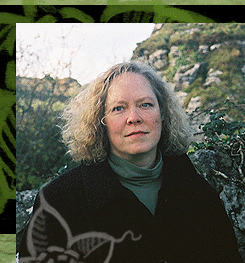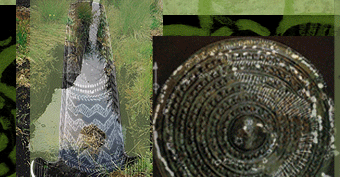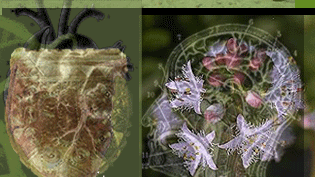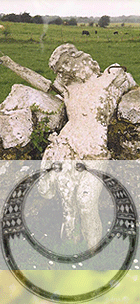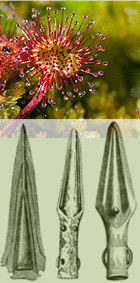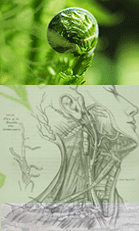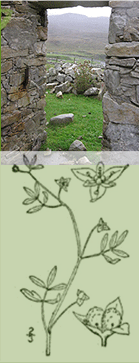THE BOOK OF KILLOWEN
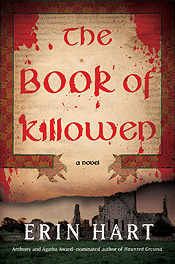
Excerpt
PROLOGUE
Domfarcai fidbaidæ fál fomchain loid lúin luad nad cél. Huas mo lebrán indlínech fomchain trírech innanén . . . Fommchain cói menn medair mass himbrot lass de dindgnaib doss debrath nomchoimmdiu cóima cáinscríbaimm foróda ross.
A hedge of trees surrounds me: a blackbird's lay sings to me—praise which I will not hide— above my manuscript—the lined one—the trilling of the birds sings to me. In a gray mantle the cuckoo sings a beautiful chant to me from the tops of bushes: may the Lord protect me from Doom! I write well under the greenwood.
—Written in the margin of Priscian's Institutiones Grammaticae (a Latin grammar), as it was copied by an Irish monk, mid-ninth century
Anno Domini 877 An Feadán Mór, Éile Uí Chearbhaill, Éiru
The oak wood was still. All sound seemed soaked up by the thick carpet of moss underfoot. Eóghan stood gazing up into the branches of a giant oak. He stretched as tall as he could, but the gallnuts hung just out of arm's reach, dangling from a branch above his head. He knew from experience that this particular nut contained the worm of a wasp—and the handiest best substance for making good dark ink. Eóghan threw his arms around a stout low-hanging branch and swung his legs up over it. He was an agile climber, having spent many hours in the oak grove near the monastery where he had lived as a child. Soon he was buried in thick sprays of foliage, straddling the branch and inching out toward his quarry, the galls that hung like brown fruit from clusters of leaves. From this perch, he could see his master walking in the morning sun along the edge of the bog where they had spent the night.
Eóghan felt the tension building inside him, then a sudden rush of air as a bewildering noise erupted from his throat. "Cuh-cuh-CUH!"
The master was well used to such outbursts. He turned and raised a hand to his eyes, peering up into the tree. "Ah, you're awake. God be with you, Eóghan," he said.
"Cuh-cuh-CUH!" Eóghan shouted again, in reply. Out here in the wood, his voice blended with the sounds of birds and animals, absorbed by the forest floor. Back in the world of men, his yelps and cries had rung out against stone, echoing and reverberating, out of place and rude. Here he was a part of nature, another element in the seamless world of wonders rather than an aberration.
Eóghan could not help what was happening. He had ever been like this. Devil-touched, his own father had called him, and had beaten him sorely nearly every day of his life, in a vain attempt to chase away the demons. When she could bear the beatings no longer, his mother had carried him to the monastery—he was still a child—and persuaded the monks to take him in, to train him up in their ways. The brothers had not been unkind, but in truth they held out little hope for him. They'd thought him simple and put him to work plucking birds for the cook, or gathering nuts and mushrooms in the wood, where his shouting and random gestures could disturb no one but the other wild creatures.
Eóghan inched forward, keeping his oak gall quarry in sight, remembering those early days at the monastery, considering how they had brought him to this place. He had often been set under the kitchen window, where the cook could keep a close eye on him. As he worked, he used to watch the monks strolling from the church to the Scriptorium.
The Scriptorium began to intrigue him. Whenever he was sent to fetch water, he would upend his bucket and stand upon it to peer through the windows, spying on the monks at their writing desks, each with a sheet of calfskin in front him, covered in black marks and designs such as Eóghan had never seen before. At a table in one corner, one brother often worked stitching together calfskin pages, marking them with barely visible lines, or tooling the leather covers that would eventually bind them. Around the walls of the Scriptorium hung leather satchels filled with books, for that was what they were called, these monks' writings. For months, he had lurked outside whenever he could, watching their painstaking work, fascinated by the brother who made the inks, his crocks full of insects and dried berries, his beakers of wine and blocks of crystal gum. Eóghan had longed to be inside, not just to be near the fire but also so that he could see how everything was done. He had to take great care not to be noticed at his hiding place outside the window. When the shouting fits came upon him, he would stifle the sound with his fist, punching the words and noises back down his throat.
Eventually he had begun to steal into the Scriptorium at night, to gaze upon the work on each writing desk, the pots of ink in every hue. He studied the marks the monks had made, recognizing the same shapes repeated over and over, each page recognizable for its subtly different hand. He traced the shapes of elaborate capitals, studying how the scribes had devised their miraculous designs. To him, every codex hanging from the pegs upon the walls was a living thing, a great soul-cry come to life in a myriad of shapes and colors, in the wild eyes, the bared teeth and talons of the long-necked peacock, the calf, the dog, the eagle. In his dreams, the animals from the manuscripts moved and spoke, fought fierce battles. It seemed that a kind of secret life was hidden everywhere and in everything, and books were no different.
As he worked in the kitchen, he began to mark out the shapes he'd seen in pig's blood, or the juice of a beetroot, tracing over and over, seduced by their sinuous outlines, taking care to destroy any recognizable character whenever the cook passed by.
On one of his nighttime forays into the Scriptorium, he found a wooden cask full of oak galls, more crushed in a mortar on the ink maker's table. He had seen these growing in the grove whenever he was gathering mushrooms or acorns for the cook. So he had begun collecting galls each time he went to the oak wood and secretly adding them to the ink maker's store. Then one night, as he was leaving his gift of gallnuts, the door of the Scriptorium had burst open.
"There he is!" shouted Brother Alphonsus, the ink maker. "I knew someone had been here. Catch him!"
Eóghan smiled, remembering how he had led the monks on a wild chase that night, leaping over writing desks, spilling ink everywhere. He was younger and more agile than any of them, and by the time they finally caught him, the whole monastery was awake. Faces crowded into the doorway, and the Scriptorium was filled with flickering candlelight.
All at once, the crowd at the doorway parted, and a single figure approached. He was short in stature and quite rotund, with a kindly face and a ringing voice. "Unhand the boy," he commanded curtly, and the monks complied, releasing Eóghan's flailing limbs and backing away. The newcomer was a visiting scholar and evidently a man of some importance, to judge from the way the monks bowed to him.
"What are you doing here, boy?" the scholar asked. "What business do you have here in the Scriptorium—in the middle of the night?" His voice, though strong, was also gentle.
Eóghan felt himself color, even now, years later, remembering his response. "Arse-lick," he'd replied. His hands felt blindly for the galls in his bulging pockets, mortified at his own words but unable to stop them. "Cuh-cuh-cocksucker. Arse-lick." He'd heard the sharp intake of breath, watched the faces around him drain of blood waiting for the visitor's response.
"Why don't you show me what's in your pockets?" the scholar had calmly replied.
Eóghan had rubbed his hands together and touched his forehead three times, then reached into his pocket and brought out a handful of galls. A new light of understanding shone from the scholar's eyes.
"He's mad," came the abbot's voice, trying to soften things. "This boy works in the kitchen, Excellency. He's simple in the head, doesn't know what he's doing."
"On the contrary, I think he knows exactly," said the scholar. "You may leave us."
"But Excellency, if this boy was stealing from the Scriptorium, he must be punished."
"You would flog the lad for replenishing your stores? That's what you were doing, wasn't it, boy?"
"Cac-cac-cac," Eóghan had replied, flushing and nodding furiously. "Cac-cac-eater!"
And so it had begun that night twenty-seven years ago, his apprenticeship as a scribe. His protector, the visiting scholar, had eventually left them, but not without exacting a promise from the abbot that he would be brought up in the way of the scribes. At first the monks resented him, a mere boy plucked from the mud at the scullery door, but none would deny his growing skill. At the beginning they allowed him only to gather the gallnuts for their ink. When he'd proved himself adept at that task, they had shown him how to crush the galls with mortar and pestle, then soak them in wine to extract the essence. They'd taught him how to boil that essence down and mix it with gum arabic and vitriol to make a strong black ink. How to mix copper ash for purple, white flake for red, hawthorn berries or eel gall for yellow. In seven years, they had taught him nearly everything contained in their Book of Secrets, and he had learned it well. He had shown himself so diligent in the study of inks and ink making that the monks began to teach him how to cure and stretch the calfskin for vellum, how to measure and mark pages for a gathering. Still not satisfied, he begged to be allowed to take up the pen. To write.
And that was when he had truly surprised them all. For the act of writing stilled his tongue, his hands. He never once shouted or touched his head while copying. At the lettering, no hand was steadier. What magic was there in word making that kept him steady? God was with him then, the monks said. It was sacred, that moment—mind and hand together distilling thoughts into words. How could any human creature know greater joy? It was only when he laid down the quill that the fits came upon him again.
When they taught him to read, how he had pored over the precious gatherings, breaking the rules and burning a lamp into the wee hours to soak up all he could, his soul burning like his illicit flame with a desire to know. Eóghan had begun to understand that he had suffered all these years from a surfeit of words, too many for his heart and mind to contain, so they kept spilling out of him. In principio erat verbum, the Scripture said—In the beginning was the Word, and the Word was with God, and the Word was God. Verbum, verba, verbi, verborum, verbo, verbis, verbatim, verbalis, verbosus.
Then his master the scholar had returned and taken him abroad to the Frankish court, where they worked for nearly twenty years, translating and creating new thoughts from old, the master reciting great strings of words, Eóghan diligently writing them down. At the start of all that, he had previously only made faithful copies; this work in which the master was engaged was something new, connecting his own fleeting thoughts to concrete words, and not only that, but also creating in their arrangement an object of profound beauty, like a spider spinning a web.
Three months ago he and his master had set out upon this pilgrimage, from Laon back to Eiru, the place of their birth. Eóghan did not know the master's reason for this journey. When he asked, his master replied only, "Even wild creatures return to the places whence they've come." Two nights ago, they had lodged at the monastery not far from here, where he and the master had met, where he had learned the secrets of the scribes.
Eóghan looked down from his perch in the tree at the master, still sunning himself by the edge of a bog pool. The oak leaves around him stirred in the breeze, and morning sunlight played on the water, making a golden checkerboard that seemed to move and meld together, and Eóghan was filled with such an unaccustomed feeling of well-being, his mind combining the contours of the oak leaf with the glinting ripples—all part of the enfolding mysteries of vitae aeternum—and he knew exactly what sorts of embellishments he would try out on the pages his master would dictate today. They would argue, and Eóghan would ask questions. He had become a part of the master's work. He was even allowed to add a gloss from time to time, adding the warmth of his breath to amplify the master's thoughts and words. It was a joyful thing, seeing their two hands on the page side by side.
All at once, Eóghan's thoughts were disturbed by a distant, faint sound of horses approaching. A jagged panic shot through him. From childhood, his first impulse at the prospect of meeting unfriendly stares had always been to hide. And so he climbed higher in the tree, hoping to conceal himself amid its leathery green leaves. As he slipped from sight, a pair of horsemen came charging through the wood, pausing directly below the tree where he was concealed. The forest floor muffled any hoofbeats; all Eóghan could hear was the squeaking of leather saddles, the rasp of labored breathing.
"There he is," the first horseman said to his mate, pointing through the trees at the master. "I confess it's beyond me why anyone should be frightened of such a weak old man." The second rider only grunted. They were so close below Eóghan that he could smell the rank odor of their bodies. There was an edge in the speaker's voice that said these two were fighting men. They seemed to know his master—what were they after?
Eóghan felt a sudden whirlwind of words in his throat, trying to force their way out, and his first instinct, as always, was to keep them from escaping. He stuffed his fist into his mouth and bit down hard, pain erasing for a brief moment the overpowering need to speak.
The first horseman spurred his mount out of the wood and down to the bog's edge, his silent second following. The master turned to them, offering the traditional greeting: "God be with you." In answer, he received a clout across the face that bloodied his lip and robbed him of breath. He staggered slightly but did not cry out.
Hidden in the oak, Eóghan felt the air around him crackle with danger. He must do something, help the master, but how?
"Are you called John?" the first horseman demanded.
"After the Baptist," the master replied mildly. "The very same."
The first horseman gestured to the leather satchel at the master's feet and exchanged a glance with his mate. "Where's your servant?"
"I wish I knew," the master replied. "He disappeared last night. Took our store of food—I'm left here with nothing to eat but my own words." He gestured to the satchel on the ground.
Eóghan nearly cried out. He had taken nothing. Why was the master lying? He felt a slowly rising horror as the horsemen dismounted, and each drew a knife from his belt. The pair of them fell upon the old man, thrusting their blades with an upward motion, again and again and again. Over the assassins' shoulders, the master raised his eyes to the tree where Eóghan crouched, hidden among the leaves. "The beginning and the end," the old man wheezed. "Alpha and omega."
At last the two horsemen stepped back and let the master's lifeless body topple to the ground. Eóghan could hardly breathe, but he felt the uncontrollable sounds begin to rise within him once more. He bit down on his fist again, this time tasting salty blood. Shield me, cover me, he prayed to the tall oak, to each of its branches and leaves. Hide me from the conspiracy of the wicked, from the noisy crowd of evildoers.
Suddenly a third horseman burst through the woods, pulling his beast up short and dismounting beside his fellows. "So you found him. Good." He spat on the master's body. "How goes it for you, heretic? No king to protect you now!"
The third man snatched up the satchel from the master's feet and looked inside, removing the book he found there and paging through it hungrily before flinging it aside. "Bloody fools!" he shouted. "Amadáns! You should have checked the book before you killed him. It's not the one we're after; it's only a bloody Psalter!"
Eóghan felt the last word like another blow. The Psalter was his own, the one he'd copied out for himself. But if the master had his Psalter, what was in his own bag? He suddenly felt the weight of the satchel pulling him down like a stone.
The third horseman wasn't finished. "What about the idiot servant?"
"Gone. We looked everywhere," the first assassin lied.
The third man narrowed his eyes, trying to gauge whether his defiant underling spoke the truth. "Well, see that you find him. It shouldn't be too difficult. They say he howls like a banshee." He swung his leg over his horse again. "Now get rid of the body—see if you can manage to get that right."
Eóghan could only watch as the two men dragged his master out onto the bog. They pushed the body into a dark pool, waiting until it was swallowed up without a sound. Almost as an afterthought, the second horseman reached for the Psalter and satchel and flung them into the pool as well. Still hidden in the tree, Eóghan covered his mouth and wept silently, watching as the open book seemed to float for a few seconds, like a pale pair of wings, and then submerged.
As the assassins remounted their horses and began to ride away, Eóghan felt a noise building up inside him, and this time there was nothing he could do to stop it. "Cuh-cuh-CUH!" he shouted.
The noise being sufficiently inhuman to their ears, the horsemen never even turned around but kept riding eastward, the direction from which they'd come. Perhaps they mistook him for a bird, nothing more than a corncrake clattering for his mate.
Eóghan waited in the oak tree for what seemed like hours, starting at every noise, listening for the sound of horses, but the assassins did not return. Finally he uncoiled himself, stiff from clinging to the sturdy branch, and crept down from the tree.
He knelt at the pool's marshy verge and hung his head in shame. His master was gone, sunk forever into this soft and treacherous bog. Eóghan tried in vain to remember the office for the dead, but each time he tried to sing, he found he could not bring forth any sound but weeping.
At last, he reached for the satchel that hung by his side and opened its flap, drawing out the simple leather-bound volume. The master had surely switched Eóghan's humble Psalter for his own codex, but why? This was the book they were inscribing together, by turns, the continuation of the master's great work. Eóghan remembered the assassin's voice: No king to protect you now. Were the words on these pages really worth a man's life?
Alpha and omega, the old man had said. The beginning and the end.
Eóghan's lips began to move as he recited the words that always calmed him. In principio erat Verbum, et Verbum erat apud Deum, et Deus erat Verbum. In the beginning was the Word, and the Word was with God, and God was the Word.
He suddenly understood that he could not return to the monastery. Slinging the leather satchel across his body like a sword belt, he set off in the opposite direction. Preserving the precious codex had become his sacred charge. He vowed to protect this book, defend it if necessary, and keep it safe from all harm.
![]()
BOOK ONE
For chubus caich duini i mbia ar rath in lebrán col-lí
ara tardda bendacht for anmain in truagáin rod scribai.
Be it on the conscience of every person who shall be
graced by possession of this beautiful manuscript,
that he bestow a blessing upon the soul
of the poor wretch who has copied it.
—A colophon from the Book of Deer, a ninth-century manuscript
1
Kevin Donegan grasped the twin joysticks and thrust the right one forward, feeling the fierce hydraulic power in the arm of his backhoe. He loved working the controls. Truth to tell, he often dreamed that he was not driving the machine but part of it, wielding not just one but two scoops like gigantic hands. He smiled, reveling in his rusty strength, iron fingers cutting through soft peat, huge arms knocking evildoers on their arses left and right, riding to the rescue of a bewitching blonde who couldn't wait to show her undying gratitude. He was the mighty Diggerman, feared by all who dared oppose him. Invincible.
It was early enough that mist still covered the lowest parts of the bog, an eerie presence that muffled the sharp cries of birds, the unearthly keening of a hare. He'd been on this bloody job for two days, trying to get the drain cut, and it would likely take another three days before he could be on his way. Nobody had said what the peat would go for—not that he gave a rat's. Not his job. Diggerman just dug the holes, cut the drains, and then moved on to the next job: trenching for gas lines, foundation excavation. Whatever. He was in at the start of the job, not to see it finished. Never saw much of anything finished. Better that way.
As he saw it, Diggerman wasn't about putting down roots; his job was turning things up. It was pretty much the same in the romance department. He usually liked being the first to open a trench, and he much preferred girls who were a little nervous and inexperienced. In and out he was, just like Diggerman, and then gone like the wind.
Remembering the ever-so-pleasant bottle blonde and the happy ending of his recurring dream, Kevin thrust the joystick forward again, maneuvering the digger's huge arm into position for another scoop of wet peat. He jammed the left lever forward to let the bucket drop. This time it landed with a loud clunk.
That was odd. Apart from the noise of the machine, cutting a drain was usually dead quiet. He lifted the bucket and set it down again. Clunk. Could be something dangerous—a drainpipe, maybe a gas line nobody had bothered to flag. Holy Jaysus.
Kevin jumped down from his seat and grabbed the spade he kept always at the ready in case of emergency. The teeth of the bucket had struck something hard, punctured it, from the look of things. He began to recognize painted sheet metal, a bit of chrome, and . . . was that a taillight? It was. What kind of a fuckin' bollocks would go and bury a car in the bog? That's what it was, and no mistake. Not something you'd see every day. He started using the spade to clear away all the peat on top of the boot, which was badly creased by the blow from the heavy bucket. As soon as the weight was lifted, the boot popped open on its own, and Kevin's mind groped to put a name on what lay before him.
He was staring down into the sunken, sightless eyes of a wizened, bluish-brown face. He felt an almost irresistible urge to scramble up the bank, but fought it, fascinated and repelled by the horror before him. At last he managed to assemble a coherent thought. A body. His eyes traveled along the limbs sprawled in the peat—a forefinger and thumb, a shod foot, a knob of bone protruding from a twisted joint. This was a man, all right, but the parts of him were mixed up, a foot where a hand should be. This wasn't just any dead body—it was murder. He remembered grisly accounts he'd heard of people topped over drugs and sacks full of cash. Kevin suddenly felt the blood drain from his head, and he leaned on the spade handle to keep from swaying. But he could not look away.
The possibilities skittered around in his brain: he could run, he could check for a stash of drugs or money in the boot, he could ring the Guards, ring the boss. Which was it going to be? One thought pushed its way to the fore. The job had been very hush-hush from the start. The boss, Claffey, advised him not to mention to anyone where he'd be working the next few days. Had to be off the books, illegal somehow. He usually never gave a fuck about permits or planning permission—not his trouble, and besides, he badly needed the work. Claffey might tell him to get on with it or get out. Although Kevin had realized ages ago that he didn't have many scruples, somehow ignoring a thing like this wouldn't seem right.
He began to recall reports of a bog man uncovered over in Offaly a while back. That poor bugger turned out to be a couple thousand years old. Who was to say this fella wasn't as old as that?
Suddenly he saw himself on camera, being interviewed about this body. All the television crowd were bound to cover it. He could see the reports on RTÉ, UTV, TG4, maybe even Sky or the BBC—a bog man like this was big news, no matter how old he was. It began to dawn that people would be asking him about this moment for years to come. He'd be something of an instant celebrity, if he played it right. He imagined women gathering around him, female voices breathy with a mixture of curiosity and pity.
Kevin reached for his mobile to ring emergency services, hoping to Christ he'd get a signal way out here in the middle of the bog and relieved when the call finally went through. Conscious of an unwanted edge of excitement in his voice, he started explaining to the operator exactly what he'd been doing when he found the body. He knew emergency calls were recorded—the television people might even play a bit on the news reports. Had to make sure he sounded unflappable, in control.
The operator told him to not to touch anything and assured him it would be no longer than twenty minutes before the Guards arrived on the scene.
Nothing for it now but to wait. He climbed back up into the digger to break out his lunch, three cello-wrapped sandwiches and a couple of boiled eggs he'd picked up at a petrol station this morning. Biting into one of the boiled eggs, he caught the empty eye sockets staring up at him from the car boot, the dead man's mouth hanging open like the beak on a hungry fledgling. Suddenly he had no appetite.
As he thrust the half-eaten egg back into the carrier bag, the presence of malice overwhelmed him, a roundly sweeping paranoia, bringing with it all the nights he'd spent as a child listening to his grandparents sitting around the fire with the neighbors, as each in turn described the eerie happenings they'd witnessed or heard tell of.
At that exact moment, a dark cloud passed in front of the sun, casting the whole bog into shadow. Kevin reached down to roll up the cab window. Why take a chance? The scorching weather they'd been having these past couple of weeks was well known to bring on chills. He checked his mobile—only four minutes since he'd rung off with the emergency services. Kevin shoved the phone back in his pocket. And suddenly twenty minutes seemed like an awfully long fuckin' time to wait.
![]()
© Erin Hart, 2013
